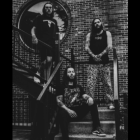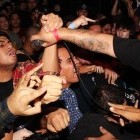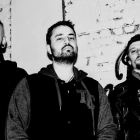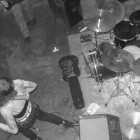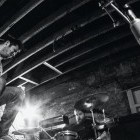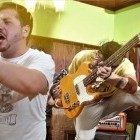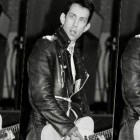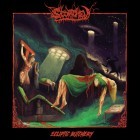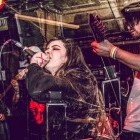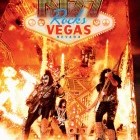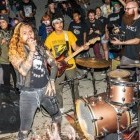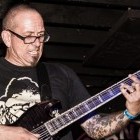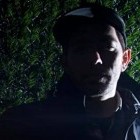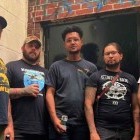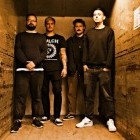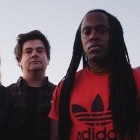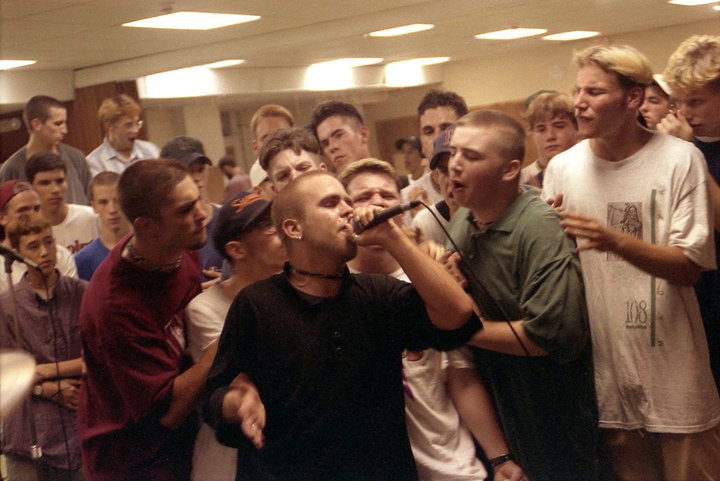
Growing up in a small town in Ohio, I had access to not only my local music scene, but also surrounding areas, such as Columbus, Cleveland, Erie, and Detroit. The art, politics, and music that resulted from '90s hardcore resonate with me more than any other era. I became engulfed in the culture, and it was life-changing. Often times bands from the “Coasts” get all the attention, and rightfully so, but sometimes this comes at the cost of overlooking many great bands from that time. So, for my first of hopefully many contributions to No Echo, I present to you the first installment in my Midwest Connection series.
In this interview, I catch up with one of my favorite vocalists, Rob Pennington. Rob has fronted many amazing bands over the years; most notably, Endpoint, which started in the late '80s and continued on until 1994. In addition to Endpoint, Rob was also the vocalist for two of my favorite of his projects, By the Grace of God and Black Cross. Rob just played his last show in his home town of Louisville after a long run with the band, Black God, before moving to North Carolina.
Rob’s talents and character are not only exemplified by his extensive resume, but also by his long-time relationship with his band-mate and friend Duncan Barlow. These two have spent the biggest part of their careers playing music together with astounding results. I hope to speak with Duncan as well and get his perspective on his friendship with Rob, as well as to learn more about their early years making music together. As far as I am concerned, they are the “Ray and Porcell” of Midwest hardcore, and two prominent influences in my song writing and life. I caught up with Rob while he was in the middle of moving and starting his new job, yet he was more than gracious with his time and was a pleasure to speak to.
Where did you grow up and what got you into music and the punk/hardcore scene?
I grew up in the 'burbs in Louisville with two hardworking parents, no siblings, and one angry cat. There was a lot of tension in my house between my parents and that combined with a well-earned status as bully bait, I was primed for a hard crash into high school. It was about that time that one of my now dearest friends, Myron Hardesty took me under his wing. I became a paperboy under his tutelage and we spent the wee hours in discourse about music, mysticism, and philosophy. Our friendship led me to punk and the Louisville scene. He’s still a hero to me. It’s a story common to most of my generation. We didn’t seek out punk, it found us. It saved us.
How did you and Duncan meet, who were your influences and what made your writing so prolific?
I am not sure where it was we first met, though I think it was hanging outside of this teen club called Thumpers. Later, he kicked me (I think he was just blinded by his devil lock) as I skanked past him while his band Crisis played. Later, we started playing together when a friend recommended me to sing for his new project Death Watch. We practiced in his basement, and I think I jumped around and rolled on the floor. I don’t think Duncan and Jason (Graff) knew whether I was serious or just kidding around. Maybe they just felt sorry for me, but ultimately, they took me in. It was so great playing with those guys, and more importantly spending time with them. Duncan and I became fast friends and spent a lot of time together hanging out in parking lots, suffering a host of teenage crises together.
I think we were listening to everything. Duncan had started early, as he had an older sister that turned him on to alternative music. I was trying to catch up consuming whatever I heard. I loved Rites of Spring, Embrace, Gray Matter, Uniform Choice, Youth Brigade, Black Flag, and Hüsker Dü, but local bands had the greatest influence on me. Maybe because there were accessible, but also because they were pretty fucking good. If you haven’t done so, check out Solution Unknown, Fading Out, and Squirrel Bait.
There are significant changes in styles from the first Endpoint record to the last. Is that something that happened organically or did you purposefully set out to make one album different than the other?
I believe we just got better at our instruments and our influences changed. If the Spirits are Willing reflects a range of influences because we were listening to so many different types of bands (punk/harcore/metal). Then Duncan, Chad, and I started listening to a lot of New York and California straight edge bands and out came In a Time of Hate. That phase was brief, and when we returned to listening to a wider range of music, we returned to be more interested in trying new things with the band.
After Endpoint broke up what led to the formation of By the Grace of God?
The breakup of Endpoint was necessary but also hard for me. Through Endpoint, I found something in myself that wasn’t there before. Our shows were so emotional and our connection with the audiences seemed so real that it was easy to find myself lost towards the end of the band and afterwards. It’s like we lived in the place of heightened emotional stimulation, it was too much but then it stopped and the quiet was hard to bear. Duncan was moving forward with Guilt, I had started a project called Amaroq, and we were all sorting things out.
As the dust of Endpoint settled, I began to realize that one of the best parts of that experience was my friendship with Duncan.
I can’t remember exactly how it happened, but we found ourselves wanting to play together again, recruited Thommy from Amaroq, Jay and Johnny, and formed By the Grace of God. We had so much fun in this iteration because we were less uptight because we had already experienced Endpoint. The four of us poured our hearts into this band and short a strong start has maintained us on through today.
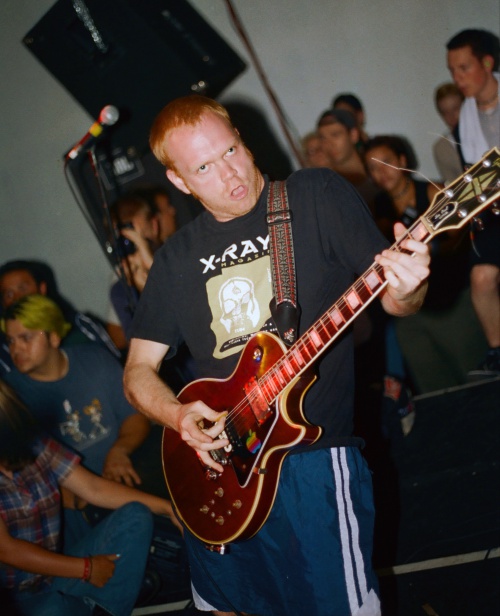
Your vocal style, which is one of my favorites, became a bit more aggressive in By the Grace of God but still stood out from the more "growly" bands of the time. Again, is that something that just happened or was there a specific motivation behind it?
That still sounds so strange to me because I have hated my voice up until the end of Black Cross. There was no planning it’s just all I had. I didn’t have the vocal chords to growl and I always like melodic or screamy hardcore with the exception of a few bands (e.g., Laughing Hyenas, Born Against). I think my voice changed from By the Grace of God to Black Cross, as I explored different ranges in my voice, but also because the music asked for something different. Ryan and Evan Patterson encouraged me to try new things in the studio and grew because of it. I also experimented in Minnow which helped me in BG. Minnow was a fun band I did with my wife, Becca and two local legends, Doug Maxson and Carrie Neumeyer.
What was it like being on Victory Records during their heyday and why did you part ways?
I am appreciative of them putting out those first two records. They gave us the opportunity to record Perspective with Steve Evetts [Dillinger Escape Plan, Sepultura] and that was an amazing experience. We left because we felt our message was not consistent with decisions that Victory had made. I appreciate [Victory Records owner] Tony’s [Brummel] contribution to By the Grace of God’s capacity to share its message and don’t harbor any bad feelings.
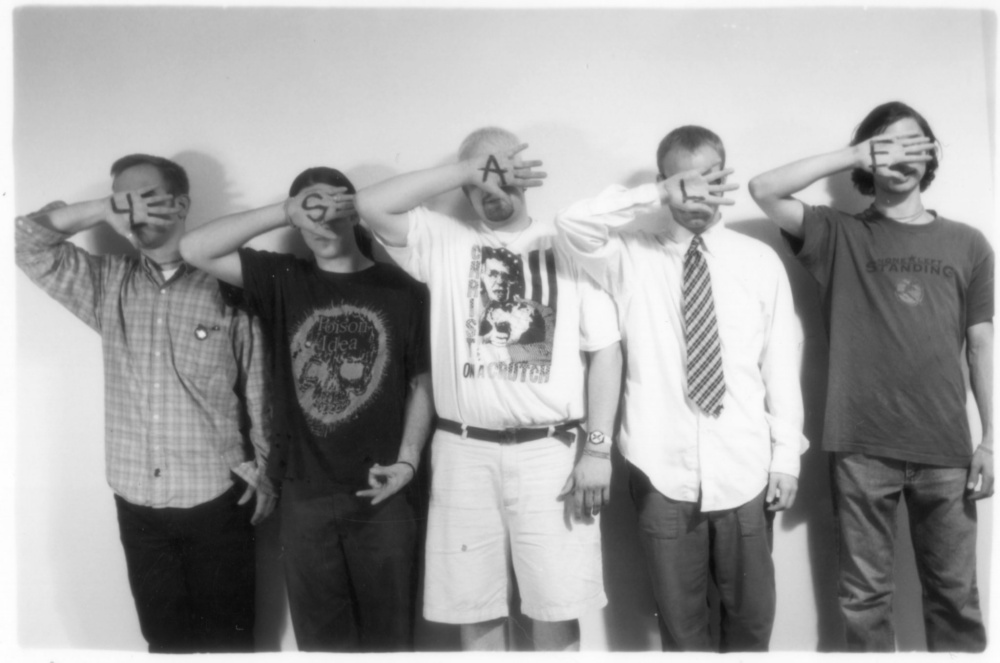
So often your bands have been dubbed "political." Personally, I think there is a perfect balance of music and message. What are your thoughts on that label?
By the Grace of God was personal. We didn’t seek to write songs about the specific issues, I wrote lyrics about what I was feeling or thinking at the time. My lyrics often start as a line about one things and then morph into a completely different narrative.
I read in an interview a few years back that you like to keep the possibility of all your bands playing open ended. That aside, how did it feel to play your "last show" in Louisville?
Oh man, I loved Black God, Ryan, Nick, and Ben. As you know, I just moved to Charlotte and we just couldn’t keep it going. Those guys are so talented and need to commit their time to their other great projects! That being said, I would play with them anytime if the opportunity appeared.
Give me your top 3 favorite songs from your personal discography. Mine are "Remora," "Guess Who's Coming to Dinner," and "Black Skies":
Those are good ones. I love that you dig Guess who’s coming to dinner, it has a powerful origin.
"Iceberg" (Endpoint) — because I when I play it, it still makes those dark memories of my younger depressed self dance.
"NickleLipService" (Ousia) — I loved that band and it is so different than all the rest and probably sounds most like the music to which I actually listen
"Skinnerian Dilemma" (By the Grace of God) — Its on the new album and I just really enjoy the cadence and message.
"Cast You Out" (Black God) — Ok, I know this is 4, but I this song is so fun to play and speaks to my contempt for the worst within the Church.
What are some of your thoughts on the current state of the hardcore scene and who are you listening to these days?
I am not sure if I am the best person to provide any perspective, as it is hard to keep up with newer bands these days. I spend a lot more time reading dissertations and manuscripts than checking out new bands. I still listen to a lot of old music, not because I believe it’s better. Based on what I have seen in Louisville, it appears that bands from different genres are playing together again, which is awesome! There also seems to be greater acceptance of our queer brothers and sisters in hardcore. Recently, I saw a rad band from Louisville called Transgression that ripped. What I hate about the some of the new shows is the crowd killing goons. It’s a bunch of fucking bullies trying to have fun at others expense. It’s the worst and bro-ish.
Tagged: black cross, by the grace of god, endpoint, midwest connection

